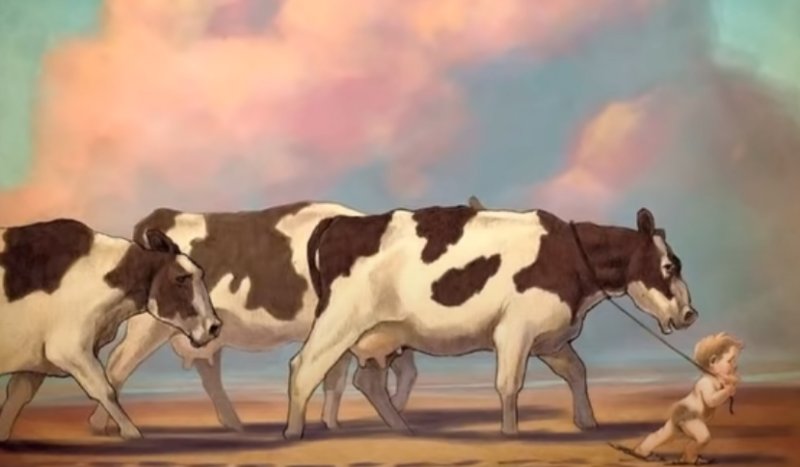Baby God Hermes Started His Life As A Liar And Trickster
A. Sutherland - AncientPages.com - Greek mythology is rich in myths and legends about creatures, goddesses, and gods. According to the ancient Greeks' concepts, the gods are definitely not perfect, morally glorious, all-perfect beings. They are beings endowed with passions like humans, and even to a much greater extent.
God Hermes was a clever trickster. Credit: Atelier Sommerland - Abobe Stock
However, according to Homer's poems, there is one important difference between these divinities and humans: they are free from all human troubles, regrets, and sorrows, living freely, enjoying their youthful strength and sensual pleasures, eating ambrosia, the food of the gods, and drinking nectar.
Today's legend is devoted to Hermes, (Roman name: Mercury). As soon as Hermes was born in the cool cave on Mt. Cyllene in Arcadia, he began his life as a trickster and a liar.
His first trick was to steal the cows from Apollo, who was tending the flocks of the gods in the valley of Pieria in Macedonia. Being more interested in music than his cows, Apollo did not even notice what was happening with his cattle.
Hermes knew that the protection of a night is often most favorable to thieves, so he stole fifty cows from the flock of Admetus, a king of Thessaly. Hermes tied reeds and branches to the cows' feet and brooms to the cow's tails to hide the cows well and cover his tracks on the road. Leading the animals backward, he even put on his sandals in the same way.
One must say that perfection was not beyond the baby Hermes' reach.
He successfully cleared the tracks of his wrongdoing, but while driving the cattle late in the evening, he met an older man working in his vineyard and said to him:
"Take one of these cows for yourself but don't tell anyone that you saw me drive the cows away here," he said.
The man, delighted with the unexpected gift, promised Hermes to keep quiet and not show anyone where he drove the cows.
Man That Does Not Keep His Word
Hermes left the older man but still wasn't sure he would keep his word, so after hiding the cows in the forest and using his ability to shapeshift, he returned to him and asked:
"Tell me, did the boy drive the cows here?" if you tell me where he has driven them, I will give you a bull and a cow," Hermes promised.
Eager to get a bull and yet another cow, the man quickly showed where the boy had taken the cows. Angry with the man for not keeping his word, Hermes turned him into a dumb rock so that he would always be silent and remember to hold promise.
Then, the baby god returned for the cows, and he quickly drove them to Pylos. He sacrificed two of them to the gods, destroyed all traces of the sacrifice, and hid the remaining cows in a cave. Just outside the cave, he saw a turtle, caught it, using one of the cow's insides and the creature’s shell, he made the first lyre.
After that, he calmly and silently returned home to his mother Maia and lay down in the cradle, wrapped in swaddling clothes. Now, he again became a little, and innocent child pretending to be asleep.
But Maia was aware of her son's absence and knew what he had been up to, so she asked:
"You've got a bad idea. Why did you steal Apollo's cows? He will be angry. You know how terrible Apollo is in his anger. Aren't you afraid of his arrows striking without missing?
Hermes was not. He even warned that if Apollo insults his mother or him, he'll take revenge by plundering his entire sanctuary at Delphi, stealing all his most valuable things.
Apollo had already noticed the loss of the cows and set out to look for them. He couldn't find them anywhere, but suddenly, he saw a long-winged prophetic bird. The god knew at once by that omen that his cattle's thief was Hermes, so he went to the cave of Maia. He found Hermes lying in his cradle with an innocent face, denying his wrongdoing. The boy assured Apollo that he had not thought of stealing the cows from him and that he did not even know where they were.
Finally, both gods appeared in front of their father, and Zeus - who claimed to have seen the events - sided with Apollo.
Having no other choice, Hermes showed that the cows were hidden in Pylos' cave, but Apollo noticed the two cows Hermes had sacrificed were absent. When Apollo's anger was terrible, suddenly a most unique and powerful sound was heard. His brother Hermes was sitting on a rock, playing the lyre.
Overjoying the wonderful melody, Apollo, a god of music, fell in love with the instrument and offered Hermes the entire herd in exchange for the lyre.
Once herding cows, Hermes invented a pipe, which became the favorite instrument of the Greek shepherds.
"He [Apollo] made him the guardian of the shepherds, gave him the power to predict the future from pebbles and gave his staff, Caduceus (kerykeion), as a sign of authority," write Michael Grant and John Hazel in their book "Who is who in classical mythology."
Hermes And Loki Are Both Tricksters
If we look at Hermes' personality, we find certain similarities to those possessed by the Norse god, Loki. Hermes is also a trickster, but his abilities to play tricks are not developed to the same extent as Loki's.
After stealing Apollo's cows, Hermes was taken to Zeus for judgment, and again, his clever mind worked for him. By using a cunning maneuver, he offered the lyre he invented to escape punishment.
In many ways, this behavior is like that of Loki's. The Norse god often was able to talk his way out of embarrassing situations.
Updated on April 1, 2024
Written by – A. Sutherland - AncientPages.com Senior Staff Writer
Copyright © AncientPages.com All rights reserved. This material may not be published, broadcast, rewritten or redistributed in whole or part without the express written permission of AncientPages.com
Expand for referencesReferences:
Austin M. M. The Hellenistic World from Alexander to the Roman Conquest
Szac M. The Adventures of Hermes Kindle Edition
More From Ancient Pages
-
 Amazing Time Capsule – La Roche-Cotard Cave Sealed For 50,000-Years Offers Evidence Neanderthals Were The World’s First Artists
Archaeology | Nov 22, 2023
Amazing Time Capsule – La Roche-Cotard Cave Sealed For 50,000-Years Offers Evidence Neanderthals Were The World’s First Artists
Archaeology | Nov 22, 2023 -
 Lady Trieu: Fierce Warrior, Rebel, Freedom Fighter And National Hero In Vietnam
Featured Stories | Feb 26, 2019
Lady Trieu: Fierce Warrior, Rebel, Freedom Fighter And National Hero In Vietnam
Featured Stories | Feb 26, 2019 -
 Ancient Bayanihan Tradition Of The Filipino People: Villagers Move Your Entire House Including Walls And Roof
Ancient Traditions And Customs | Sep 6, 2018
Ancient Bayanihan Tradition Of The Filipino People: Villagers Move Your Entire House Including Walls And Roof
Ancient Traditions And Customs | Sep 6, 2018 -
 Hidden Prophecies Inside The Great Pyramid Of Giza Discovered By Scientists
Ancient Mysteries | Jun 21, 2017
Hidden Prophecies Inside The Great Pyramid Of Giza Discovered By Scientists
Ancient Mysteries | Jun 21, 2017 -
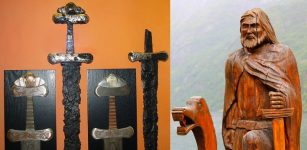 Were Viking Swords As Effective As They Were Impressive?
Ancient History Facts | May 9, 2018
Were Viking Swords As Effective As They Were Impressive?
Ancient History Facts | May 9, 2018 -
 Sir Francis Walsingham: Spymaster, Politician And Trusted Adviser To Queen Elizabeth I
Featured Stories | Nov 25, 2019
Sir Francis Walsingham: Spymaster, Politician And Trusted Adviser To Queen Elizabeth I
Featured Stories | Nov 25, 2019 -
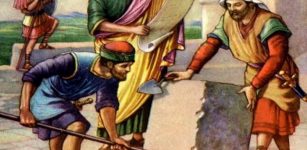 Biblical Events Confirmed: The Jerusalem’s Wall That Nehemiah Built
Biblical Mysteries | Mar 19, 2014
Biblical Events Confirmed: The Jerusalem’s Wall That Nehemiah Built
Biblical Mysteries | Mar 19, 2014 -
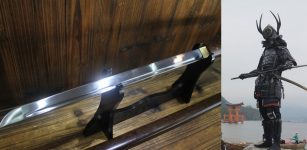 Secrets Of The Japanese Shirasaya Sword Mounting
Featured Stories | Sep 11, 2018
Secrets Of The Japanese Shirasaya Sword Mounting
Featured Stories | Sep 11, 2018 -
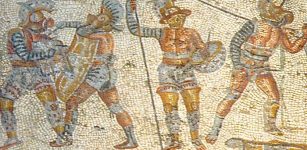 Were There Gladiators In Roman Britain? An Expert Reviews The Evidence
Featured Stories | Mar 14, 2023
Were There Gladiators In Roman Britain? An Expert Reviews The Evidence
Featured Stories | Mar 14, 2023 -
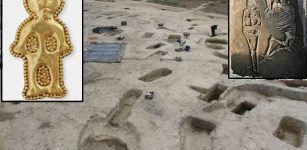 Ancient DNA And Historical Context Were Used To Explain Kinship, Social Practices Of Avar Society
Archaeology | Apr 25, 2024
Ancient DNA And Historical Context Were Used To Explain Kinship, Social Practices Of Avar Society
Archaeology | Apr 25, 2024 -
 Are Thunderbird Petroglyphs In Bighorn Basin Linked To Golden Eagle Nests?
Civilizations | Apr 26, 2017
Are Thunderbird Petroglyphs In Bighorn Basin Linked To Golden Eagle Nests?
Civilizations | Apr 26, 2017 -
 Rudra – Mighty Hindu God Of Death, Destruction, Hunting Who Heals Mortal Diseases
Featured Stories | Aug 10, 2021
Rudra – Mighty Hindu God Of Death, Destruction, Hunting Who Heals Mortal Diseases
Featured Stories | Aug 10, 2021 -
 Danger Lurking In The Woods – Strange And Unexplained Sightings – Part 2
Featured Stories | Jul 7, 2018
Danger Lurking In The Woods – Strange And Unexplained Sightings – Part 2
Featured Stories | Jul 7, 2018 -
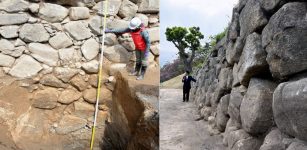 Excavations At Okazaki Castle Reveal A 400-Year-Old Massive Unbroken Wall
Archaeology | Apr 16, 2016
Excavations At Okazaki Castle Reveal A 400-Year-Old Massive Unbroken Wall
Archaeology | Apr 16, 2016 -
 LIDAR Discovers Giant Ancient Mesoamerican Calendar – Structures Were Aligned To The Stars
Archaeoastronomy | Jan 10, 2023
LIDAR Discovers Giant Ancient Mesoamerican Calendar – Structures Were Aligned To The Stars
Archaeoastronomy | Jan 10, 2023 -
 A Well-Preserved Lararium Shrine Discovered At Pompeii
Archaeology | Oct 10, 2018
A Well-Preserved Lararium Shrine Discovered At Pompeii
Archaeology | Oct 10, 2018 -
 Forgotten And Overgrown Step Pyramid Of Koh Ker – Ancient Memory Of The Khmer Empire
Featured Stories | Apr 19, 2017
Forgotten And Overgrown Step Pyramid Of Koh Ker – Ancient Memory Of The Khmer Empire
Featured Stories | Apr 19, 2017 -
 Mysteries Of The Huldufolk – The Hidden People Of Iceland
Featured Stories | Feb 1, 2022
Mysteries Of The Huldufolk – The Hidden People Of Iceland
Featured Stories | Feb 1, 2022 -
 65 Byzantine-Era Tombs Unearthed In Stratonikeia – World’s Largest Marble City
Archaeology | Feb 24, 2017
65 Byzantine-Era Tombs Unearthed In Stratonikeia – World’s Largest Marble City
Archaeology | Feb 24, 2017 -
 Cretaceous Fossil From Antarctica Reveals Earliest Modern Bird
Fossils | Mar 6, 2025
Cretaceous Fossil From Antarctica Reveals Earliest Modern Bird
Fossils | Mar 6, 2025


